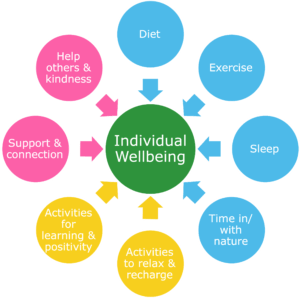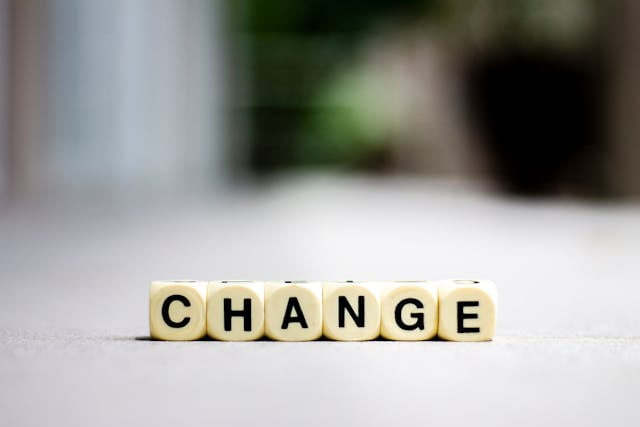By focusing on behaviour changes across a combination of physical, cognitive and emotional and social factors, we can increase the liklihood of creating lasting improvements to our wellbeing and resilience. Summary by The World of Work Project
Wheel of Wellbeing
The ‘Wheel of Wellbeing’ is term and image we use to explain, coach and facilitate conversations in realtion to wellbeing and resilience. It has been heavily informed by work on Vitality by Martin Seligman, as well as many other sources.
In the wheel, we share eight factors that we think individuals can make behaviour changes in relation to which will increase their subjective wellbeing and levels of resilience. We group these eight factors into three domains: Physical, Cognitive and Emotional and Social.

Physical Beings
We are physical beings and there are strong links between our bodies and our minds. The more we look after our physical selves, the better our wellbeing. For our purposes, we divide the physical domain down into four factors. We think that for each of these factors, individuals can create new behaviours, practices, routines and beliefs which can improve their wellbeing.
Diet
“We are what we eat” is a well known phrase. We do know that what we ingest affects us phsically and metally. If we eat a balanced, healthy diet and stay well hydrated, we tend to have higher energy levels and better physical and mental health.
When we consider our diet we should also consider everything we ingest. Drugs that are legal (at least here in the UK) like caffeine and alcohol affect our bodies and change our chemistry, affecting our wellbeing, and illegal drugs can do so even more. Similarly smoking can affect us and we consider that part of this element. NB – as former smokers, we know how hard of a behaviour change it is to stop.
Exercise
Getting a good balance of exercise into our lives has a huge impact on our wellbeing. This doesn’t need to be intense exercise, just a moderate increase in your heart rate several times a week is great for your wellbeing and mental health.
Sleep
Many people don’t get enough sleep, and we know it is hard to prioritize sleep when there is so much to do in our lives.
That said, there is loads of evidence that increasing the quality and quantity of our sleep can have not only a significant impact on our physical and later life mental health, but it can also materially increase our subjective wellbeing. In fact, increasing someones volume of sleep by just one hour per night can lead to significant changes in how happy they feel.
Fun bonus fact – when we are tired, our bodies are stingier with calories meaning we eat more and burn fewer calories.
Nature
Spending time in natural spaces (like green spaces or by the sea), or with animals can materially improve our levels of wellbeing too. Even just going for a walk in a park can make a big change to how we feel.
Thinking, Emotional Beings
We are conscious beings, subjectively experiencing our world in part through our thoughts and emotions. We have the ability to influence our thoughts and emotions through the behaviours, activities and practices that we adopt. If we do this skillfully, we can improve our wellbeing. For our purposes we break this domain of our Wheel of Wellbeing into two elements:
Activities to Relax and Recharge
There are times in life when our brains feel full and pacey, thinking quickly on subjects, not always helpfully. To counteract this, it can be helpful to make space for some mental tranquility. There are certain activities that aid us in this mental relaxation, and all of us will have some that we are more drawn to than others. Whatever our preferred choices are, it’s often helpful to make space for relaxing activities.
Examples of activities that could help us relax and switch off might include: doing jigsaw puzzles, reading, gardening, painting, meditation, cooking or even watching a film.
There are also benefits to having moments in life when we recharge actively, potentially being distracted and focused on something new that can bring us flow and new sources of energy. While exercise could fit in here, other activities might include socializing with friends, playing in a band, playing computer games, and so on.
Both of these more active and more passive sets of activites have a role to play in improving our wellbeing and resilience, and having a balance of them is a good thing, though different people benefit from each to differing extents.
Activities for Positivity and Learning
As conscious beings with thoughts and emotions, we also have the ability to influence our thinking and feeling patterns so they are more positive and helpful.
Generally speaking, we know that activities that help us learn new things or develop new skills help to boost our wellbeing.
We also know that practices like making space for gratitude, practicing mindfulness, presencing, mentalization, psychological flexibility and looking for the positive are all things that can affect our overall levels of reported wellbeing.
In our view, there are two sides to these types of practices. One side involves moving towards helpful beliefs and thinking patterns by trying to do things like focus on positives and things you can actually influence. The other side involves letting go of and moving away from unhelpful thinking patters. This process starts with becoming aware of your unhelpful thoughts, gaining separation from them and practicing not engaging with them when they arise, or letting go of them once they have arisen.
Social Beings
Humans are a social species. Being a welcomend and included member of a social group has been key to our survival throughout our evolutionary history. Even today, nearly everyone is a social being. As such, how we engage with those around plays a big role in contributing to our thoughts and emotions and overall levels of wellbeing.
Support and Connection
Making use of our social networks can significantly improve our wellbeing. There’s a reason that sayings like “a problem shared is a problem halved” exist, and that’s because when we feel connected, supported and understood by others, the world seems a lighter and easier place.
The stronger our real-life social networks are, and the more we feel like we have friends and communities to support and help us, the better our levels of wellbeing tend to be.
Helping Others and Acts of Kindness
This is perhaps our favourite part of the Wheel of Wellbeing.
Not only does being supported by others boost our wellbeing, but undertaking acts of kindness and helping others does too. In fact, helping other peoplegenerates some of the longest lasting increases to our self-reported wellbeing.
These don’t need to be huge acts of kindness either. Little things like picking up something someone has dropped, helping someone across a street or making a small donation to charity can all materially contribute to our improved wellbeing,.
How We Use the Wheel
We use the wheel as both a teaching and facilitation tool and an aid in coaching converasations.
Once we explain, explore and discuss the wheel with people, we ask individuals to reflect on how they would score themselves out of 10 for each of the eight elements in the wheel. We then ask them to identify one or two small behavioural changes that they could make which could improve their overall wellbeing.
Learning More
There’s a lot more to learn about wellbeing, which is a huge field. Martin Seligman’s work on PERMA and Vitality is helpful and Laurie Santos’ free course is excellent.
When it comes to the body and connection with the mind, it might be interesting to look at Cartesian Dualism. While we don’t look much at nutrition or exercise ourselves, there are loads of great resources on the internet for these elements. Regarding sleep, we really enjoyed Matthew Walker’s book, “Why We Sleep“.
We also think emotional intellligence is a helpful read, as are self-talk, meta-emotion and meta-cognition.
Lastly, it might be worth exploring why having new things doesn’t really make us happy (hedonic adaptation is our read on this) and why we’re so bad at knowing what will actually make us happy (miswanting is the read here).
We don’t have any specific podcasts on subjective wellbeing, but think this one on stressbuckets might be helpful:
The World of Work Project View
We’re big fans of the underlyinbg work that’s contributed to all of this.
Obviously, this is a simplistic representation of things. In reality, people are highly complex and the things that boost our wellbeing are systemic and interconnected, as well as individual to each of us, to some extent.
We also know that many of the things that are held up here as contributors to our happiness and wellbeing might be hard to come by. Not everyone has access to green spaces, nor the privlege of time to sleep more. We very much acknowledge that and are just saying that if you do have the opportunity forthings like the elements in the wheel, then then probably will contribute to your wellbeing.
We also know just how hard behaviour change is. Knowing is not half the battle, it’s much less. Making changes to what we do with our lives often involved changing our underlying beliefs, how we see the world and even the ways our brain predicts the world around us. This is not an easy thing to do.
The last thing we want to note is around the humans as social beings domain. We think this is important, and we think that we live in a pretty polarized world where it’s easy to see people as “others’, which is a shame. We also know there is a bit of a lonliness epidemic out there which materially and negatively impacts the lives of many, particularly young men in the western world. Given this, it’s great to build and maintain real relationships with people.
How We Help Organizations
We provide leadership development programmes and consulting services to clients around the world to help them become high performing organizations that are great places to work. We receive great feedback, build meaningful and lasting relationships and provide reduced cost services where price is a barrier.
Learning more about who we are and what we do it easy: To hear from us, please join our mailing list. To ask about how we can help you or your organization, please contact us. To explore topics we care about, listen to our podcast. To attend a free seminar, please check out our eventbrite page.
We’re also considering creating a community for people interested in improving the world of work. If you’d like to be part of it, please contact us.
Sources and Feedback
Seligman, M. E. (2012). Flourish: A visionary new understanding of happiness and well-being. Atria Paperback.
Also – Laurie’s course is referenced in the body of this post.
Please do let us know if there are other sources you think we should reference.
We’re a small organization who know we make mistakes and want to improve them. Please contact us with any feedback you have on this post. We’ll usually reply within 72 hours.






